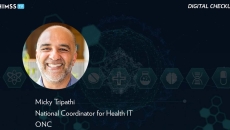Government & Policy
Healthcare leaders have weighed in on the interim 2024 Health Budget with hopes for investment in tech, particularly AI.
Texting of patient orders among members by healthcare teams is now permissible at hospitals and critical access hospitals when done through a HIPAA-compliant secure platform in compliance with CMS Conditions of Participation rules, the agency says.
A decade ago, malicious insiders sold patient health data to an identity theft crime ring and put the nonprofit provider into a HIPAA investigation. OCR reminds health systems that they have a giant target – no matter their size or stature.
The agency seeks to use extended reality and digital therapeutics to create healing "journeys" for aging Vietnam veterans that could improve their relationships with caregivers.
The National Institutes of Health may seek as much as $200 million to acquire a new electronic health record that does not depend on institutional knowledge to maintain – and can handle continuous machine learning validation.
Reflecting on recent interoperability milestones, reasonable AI transparency and electronic case-reporting timelines, and TEFCA's FAST track to FHIR exchange, Micky Tripathi, ONC national coordinator, is candid about the year ahead.
The only negative trend was a dramatic increase in the use of the Independent Dispute Resolution process.
Also, seven public medical centres in India will try out drone delivery of life-saving medicines and transfer of blood samples.
Amazon Web Services has concerns around AI use in healthcare and regulating the technology. But it can show the benefits of AI/ML in helping life sciences firms with drug development. Dr. Jared Saul, chief medical officer at AWS, discusses the issues.
Despite the hype, this buzzing AI will still have to prove its worth for Asia's cautious hospitals, says one health tech vendor.









